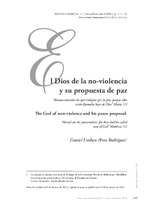| dc.contributor.author | Pérez Rodríguez, Daniel Esteban | |
| dc.coverage.spatial | Seccional Medellín | spa |
| dc.date.accessioned | 2021-02-08T21:15:34Z | |
| dc.date.available | 2021-02-08T21:15:34Z | |
| dc.date.issued | 2014 | |
| dc.identifier.uri | http://hdl.handle.net/20.500.11912/7994 | |
| dc.description | p. 111 - 126 | spa |
| dc.description.abstract | La historia de Colombia ha estado teñida por la sangre y el dolor de la violencia; pero, en medio de ella, no han faltado personas que han optado por el perdón y la no-violencia. Hechos de reconciliación como estos nos hacen preguntar: ¿Qué motiva y sustenta el perdón en medio de la injusticia y el sufrimiento? Y, para la teología, plantea preguntas que engloban de manera más general toda la problemática de la violencia y la reconciliación: ¿Dónde está Dios en medio de la violencia colombiana? ¿Cuál es el papel de la fe y la religión en la violencia? Sin duda, es el sufrimiento humano el que hace lanzar la pregunta por Dios en el contexto de la justicia y la reconciliación; además, después de los actos terroristas del 11-S de 2001 se han agudizado las voces críticas que consideran a las religiones, especialmente monoteístas, como agentes creadoras de violencia intolerante. Dentro de este marco, este artículo parte del estudio bíblico teológico de algunos pasajes “violentos” de la Sagrada Escritura, para luego analizar el origen de la violencia desde la clave hermenéutica de la “idolatría” (falsificación del verdadero Dios y del hombre verdadero) y, finalmente, intenta demostrar por qué la opción de Dios es la no-violencia revelada en Jesucristo, propuesta hecha a todo hombre y con múltiples desarrollos históricos y única posibilidad de romper el círculo vicioso y degradante de la violencia para abrirnos a la dicha de trabajar por la paz (Mateo 5,9). | spa |
| dc.description.abstract | Colombian history sums up a whole record of suffering and violence. In spite of this, many people have chosen to forgive and to practice the non-violence in their lives. We wonder then: What is the real motivation for this? How can someone forgive at the same moment he is experiencing suffering and injustice? In its turn, Theology wonders as well in the middle of the Colombian confrontation: Where is God? Which is the role of religion and faith in this particular experience of violence? No doubt, it is the human suffering the inspiration for all these questions. Also, after the terrorist acts of 9-11 in 2001, there are increasing critical voices that consider the monotheist religions in particular as producers of violence and intolerance in the world. Therefore, this article intends to interpret the origins of violence taking as a reference some “violent” excerpts from the Holy Bible; this interpretation will be based on a hermeneutic approach about the “idolatry” (counterfeit of the true God and the true man). Finally, I want to demonstrate why the decision for God is made upon the non-violence which is in a way revelation of Jesus Christ and the only possibility of interrupting the circuit of depraved and degrading of violence. And by doing this, we will be certainly working for world peace (Mathew 5, 9). | spa |
| dc.format.mimetype | application/pdf | |
| dc.language.iso | spa | |
| dc.publisher | Universidad Pontificia Bolivariana | spa |
| dc.relation.ispartof | Pensamiento humanista | spa |
| dc.rights | Attribution-NonCommercial-NoDerivatives 4.0 International | * |
| dc.rights.uri | http://creativecommons.org/licenses/by-nc-nd/4.0/ | * |
| dc.subject | Violencia | spa |
| dc.subject | Idolatría | spa |
| dc.subject | No-violencia | spa |
| dc.subject | Reconciliación | spa |
| dc.subject | Sufrimiento | spa |
| dc.subject | Violence | spa |
| dc.subject | Idolatry | spa |
| dc.subject | Non-violence | spa |
| dc.subject | Reconciliation | spa |
| dc.subject | Suffering | spa |
| dc.title | El dios de la no-violencia y su propuesta de paz “Bienaventurados los que trabajan por la paz, porque ellos serán llamados hijos de Dios” Mateo 5,9 | spa |
| dc.title.alternative | The God of non-violence and his peace proposal. “Blessed are the peacemakers, for they shall be called sons of God” Matthew 5,9 | spa |
| dc.type | article | spa |
| dc.rights.accessRights | openAccess | spa |
| dc.type.hasVersion | publishedVersion | spa |
| dc.description.sectional | Medellín | spa |
| dc.identifier.instname | instname:Universidad Pontificia Bolivariana | spa |
| dc.identifier.reponame | reponame:Repositorio Institucional de la Universidad Pontificia Bolivariana | spa |
| dc.identifier.repourl | repourl:https://repository.unab.edu.co/ | |


